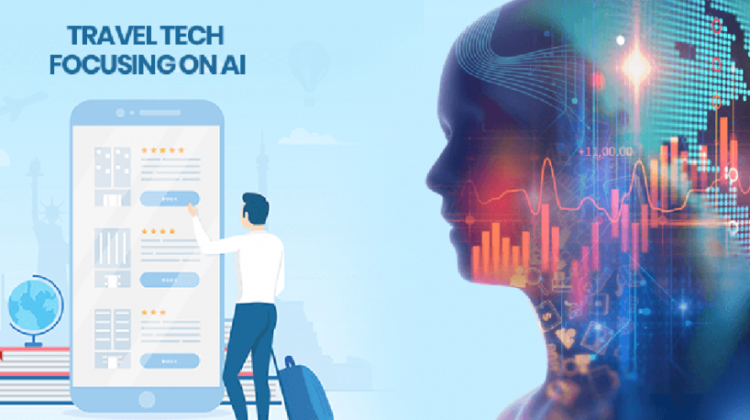
In 20 years, new technologies and the proliferation of specialized websites have changed the way we travel. Almost 74% of customers plan their trips, book a flight, and stays online. All thanks to the easy availability of the Internet, smartphones, and various travel app solutions which are used by 45% of travelers. A decade back, this was done through travel agents. Today, with a virtual reality or augmented reality app, you can get a 360-degree view of the hotel or city before your visit.
Gone are the days when you had to rely on a travel agent to plan your next vacation. Artificial intelligence is now infiltrating every aspect of the travel industry. Thanks to this technology, you can obtain a personalized and intelligent travel solution, adapted to your needs.
For instance, Google Flights is already taking advantage of AI to predict flight delays and by announcing them even before airlines. But it’s only a fraction of what AI can do. From data processing to improved customer service, this technology can accomplish a lot.
The increase in productivity now begins with finding the hotel, and the use of sophisticated AI has enabled the customer to access more data than ever before. Booking sites like provide on-demand travel services and have developed algorithms that will connect travelers with their agents online. This team then helps travelers find and book flights, hotels, and cars. In addition, travel portal solutions equip their agents with extraordinary technology to facilitate research and decisions.
Behind the scenes, everyone in the business travel industry, from carriers to agencies, to companies that make reservations for their staff, everyone wants to see better performance. But this should not be done at the expense of ease of use or flexibility.
A good travel portal led by AI can be fed with important data like budget allocations, corporate credits, and even pre-approved credit designed by the company’s HR department. These features will ensure that users stay loyal to your booking engines or sites.
AI is also used to create a better experience during the trip. Chatbots and virtual assistants provide solutions based on natural language processing (NLP). This feature helps the chatbot make relevant suggestions by understanding the context for the questions your customers ask.
Royal Caribbean Cruises has incorporated chatbots and taken the implementation of AI even further with its onboard AI. It offers RFID luggage tags, robotic bartenders, and even virtual balconies.
Skyscanner chatbot is another example of the AI technology used to improve customer service in the travel industry. It scans external sources to enable better planning and flexibility when changing travel plans. It also makes suggestions and answers questions based on hotel room availability, weather, traffic conditions, and transportation options.
The AI algorithm provides tailor-made travel recommendations by identifying trends in user activity on social media and comparing it to internal data from like-minded users.
Travel recommendations based on the person, the use of images, and personalized texts are now gaining ground to encourage travel. With 81% of people who think that intelligent machines would be better able to process data than humans, there is also a certain level of confidence in this area on the part of consumers.
The prices of flights and hotels are dynamic and vary in real-time, depending on the provider. No one has time to manually track all of these changes. This is why smart algorithms that monitor and send timely alerts on the most attractive offers are currently in high demand in the travel sector.
Armed with this information, an AI-based travel portal can create a self-learning algorithm, capable of predicting future price movements based on a number of factors, such as seasonal trends, growth in demand.
Not only are passengers affected by travel disruptions, but airlines suffer significant losses every time a flight is canceled or delayed. Amadeus, one of the main global distribution systems (GDS), has set up a timetable retrieval system, aimed at helping airlines to mitigate the risks of travel disruption. This tool helps airlines to respond instantly and effectively to any threat or disruption to their operations.
Finally, we can expect a more significant development of conversational AI in the industry. With voice search, finding and booking trips could be faster and easier than ever.
The transformation of the travel and hospitality sector will turn into an activity focused on experience and on the enhancement of assets. The large-scale adoption of AI will inaugurate a new customer experience and set a benchmark that other sectors can imitate. Fasten your belts because AI is all set to redefine the travel industry.
Have you gone digital with your travel business? Or do you have a run-of-the-mill website? It’s time you step ahead of your competitors by leveraging the power of AI. Using emerging technologies in the travel industry, you can build a brand image and enjoy customer loyalty. All you need is the best travel technology solutions provider company. We at OneClick IT Solutions have nearly a decade of experience in developing travel portal solutions to boost your business. Connect with us today for a no-obligation quote.
